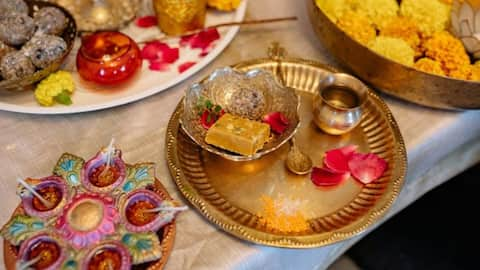Maha Shivratri 2025: Celebrating Lord Shiva with auspicious offerings
What's the story
Maha Shivratri, one of the most prominent Hindu festivals dedicated to Lord Shiva, will be celebrated on February 26, 2025.
On this day, devotees observe fasts, offer prayers, and engage in rituals that include visiting Shiva temples and performing the ceremonial bathing of the Shiva Linga.
A major part of the celebration is offering eight auspicious items to Lord Shiva, each holding a unique symbolic significance.
Ritual items
The symbolic significance of 8 auspicious offerings
The eight auspicious items offered to Lord Shiva during Maha Shivratri are milk, bilva leaves, water, Datura flowers, sindoor, bael fruit, honey and a coconut.
Each item has a unique significance. Milk symbolizes purity and nourishment and is believed to bring blessings and positive energy for peace.
Bilva leaves represent the three forms of Shiva: creator, preserver, and destroyer; their offering means self-surrender to the divine.
Water is used in ceremonial bathing to cleanse sins and rejuvenate the soul.
Ritual significance
The deep symbolism of datura flowers, sindoor, and bael fruit
Datura flowers are sacred because of their intoxicating fragrance, representing the offering of desires and ego.
Sindoor is applied with a wish for a long, happy married life and family well-being.
The bael fruit is another important offering that represents devotion and surrender, and is believed to promote spiritual growth.
Each item offered during Maha Shivratri holds deep symbolism in the context of honoring Lord Shiva.
Last offerings
Honey and coconut: Final auspicious offerings to Lord Shiva
The last offerings in the Maha Shivratri rituals are honey and a coconut.
Honey is offered as it symbolizes knowledge and wisdom, which is believed to bring sweetness and enlightenment in life.
Breaking a coconut symbolizes breaking of the ego, offering purity to the divine.
Like all other offerings, these too have deep symbolic significance in honoring Lord Shiva during this important Hindu festival.
Not just a celebration
More than a religious symbol
Apart from the spiritual symbolism, Maha Shivratri is also a time for community and family bonding.
Many people gather at temples or in their homes to perform collective prayers and rituals, strengthening social ties while seeking blessings from Lord Shiva.
The night-long vigil, known as jaagran, is a special highlight where devotees chant mantras, sing bhajans, and meditate to keep their minds focused on Lord Shiva.
